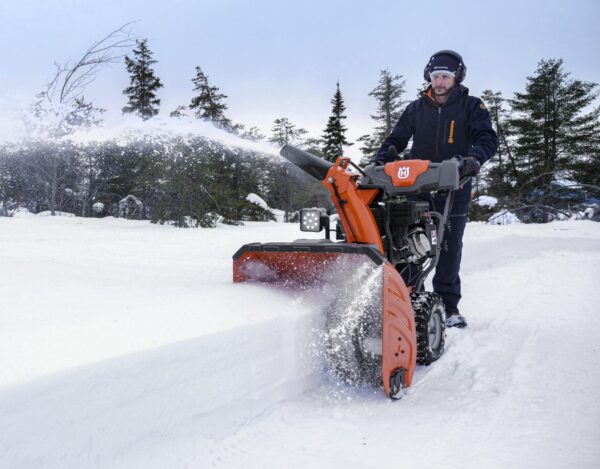The Snow Removal Business (SRB) requires prompt snow elimination to provide safe walkways to vehicles and ice-free pavement to navigate parking lots without damage. Even if the SRB has an established client base, the pressure is intense as everyone wants to be first in the morning.
Storms have intrinsic challenges. Cold temperatures present challenges for the body to perform manual labor. Poor visibility requires the use headlights, caution flashers, strobes, or warning lights. When actively plowing the top speed is a mere 6 – 10 miles per hour. Poor visibility and slow speeds increase the time to do the job effectively, and all the clients are sitting homebound watching the minutes click by slowly. Ice melt products save time, and time is money.
Bulk salt
Bulk salt is the most common de-icer used in the Northeast. This cost-effective product is effective for walkways and parking lots. Bulk salt, rock salt, or halite is sodium chloride. The same as table salt without the impurities removed, bulk salt lowers the freezing point of water forming a brine that flows under the ice to break the surface bond to pavements and sidewalks. It is the chlorine in the sodium chloride that damages property. Bulk salt only works at 5 degrees Fahrenheit. Bulk salt works faster than ice melt at reducing slipperiness by creating traction.
Chloride can damage concrete and metal. Repeated heavy applications with bulk salt can promote a slow but harmful process. The scaling and flaking of masonry surfaces, called salt fretting, is often found where the base of the building meets the sidewalk. Continued de-icing with bulk salt on masonry can cause severe fretting and the loss of pieces of masonry from the building or sidewalk. Therefore, salt is not recommended for masonry stairways. Chloride can also pollute streams, rivers, and lakes. The cheapest forms of bulk salt will cause more extensive damage to your landscaping come spring. The more expensive rock salts are better for lawn safety but more harmful on your vehicles.
Calcium Chloride
Ice Defense and Excel 50 calcium chloride 94-97% pellets are made from calcium chloride, another salt, which is the best and most efficient ice melter, to -25ºF, in the industry. De-icing products should be used with caution since they can potentially damage masonry surfaces, degrade mortar joints, and harm surrounding vegetation. Calcium chloride can attack concrete. The rounded white pellets cause skin irritation if your hands are moist, so gloves must be worn.
Potassium Chloride
Potassium Chloride (KCL) has endothermic properties and an effective temperature of above 15°F which limits the use of potassium chloride for ice melting. Potassium chloride does not irritate skin or harm plants. However, the material performs more slowly than calcium chloride, rock salt and magnesium chloride with relatively low melt volume capability. Potassium Chloride is not sold at Pantano Nursery and Landscape Supply.
Magnesium Chloride
Magnesium Chloride is sold at Pantano Nursery and Landscape Supply under the brand Snow Shield™ Pink Ice Melt. It contains sodium chloride, enhanced with CMA, and agriculture-based corrosion inhibitors to make a proprietary formulation. Pink Ice Melt continues to melt snow until the temperature reaches -13 degrees Fahrenheit. Since Pink Ice Melt releases 40 percent less salt into the environment than bulk salt and calcium chloride, it is a safer alternative for masonry less than 6 months old and plant boarders to parking lots. If landscaping safety is your primary concern, magnesium chloride although more costly than rock salts, would be your best bet.
Fertilizers
Fertilizers should never be used as a de-icing or traction agent. Fertilizers contain nitrate and ammonium sulfate which rapidly disintegrates concrete.
Truths about de-icing
- Always follow manufacturer’s instructions for use and safety.
- Before applying de-icing agents remove as much snow as possible.
- All de-icing agents can be mixed with equal parts sand to provide grit and traction.
- Concrete sidewalks and stairs should be at least 6 months old to prevent damage from de-icing agents.
- Apply pointing away from building foundations.
- Be mindful of plants bordering parking lots and roads. De-icing agents will harm plants if strong enough concentrations build up in the soil.
- Use de-icing agents moderately and remove residue during thaws and again in the spring.
- In the spring, wash down sidewalks, building bases, and areas near vegetation to help disperse the product residue.
- While rock salt has been known to cause damage over time to asphalt, concrete, and vehicles, ice melt with magnesium chloride or calcium chloride damages concrete, not asphalt, and has more limited effects on vehicles.
To purchase Excel 50 calcium chloride 94-97% Pellets, Ice Defense, Snow Shield Pink Ice Melt, or Bulk Salt contact Pantano nursery and landscape supply at 143 County Road 522 Manalapan, NJ 07726 PH: (732) 786-8503 https://www.pantanonursery.com/wholesale-perennials/

Good day! Do you know if they make any plugins to assist with Search Engine
Optimization? I’m trying to get my blog to rank for some targeted keywords but I’m not seeing very good
success. If you know of any please share. Appreciate
it! You can read similar article here: Hitman.agency